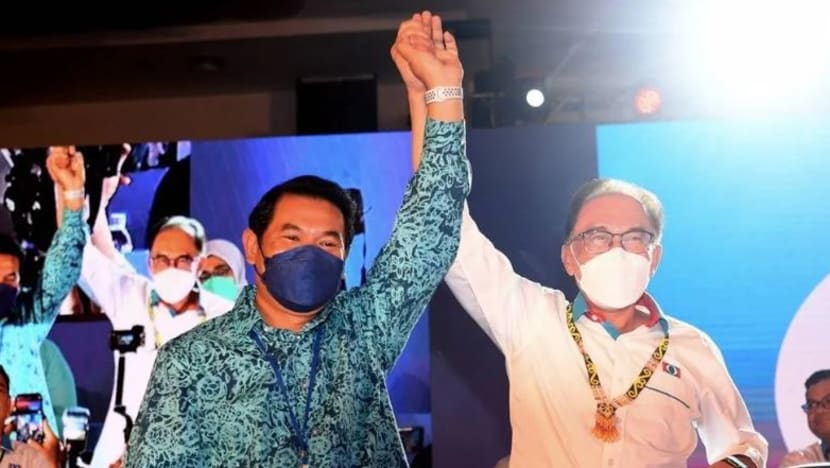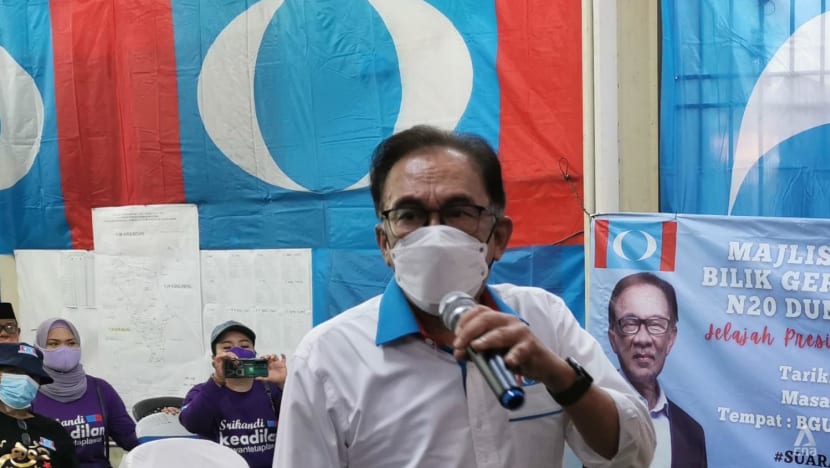Commentary: With a refreshed leadership line-up, can Malaysia's PKR reinvent its image?
Parti Keadilan Rakyat, the political party of Anwar Ibrahim, has a new slate of leaders in place. To make a difference, PKR will need to find a balance between pragmatism and the need to uphold multiracialism, says ISEAS-Yusof Ishak Institute's Dr Norshahril Saat.

Parti Keadilan Rakyat president Anwar Ibrahim (right) alongside his deputy Rafizi Ramli. (Photo: Bernama)
SINGAPORE: Recently, Malaysian opposition party Parti Keadilan Rakyat (People’s Justice Party) concluded its central leadership council (Majlis Pimpinan Pusat, MPP) election.
The party elected Rafizi Ramli as its deputy president, making him the second in command after veteran leader Anwar Ibrahim, who remained unopposed as president. Rafizi’s contender was Anwar loyalist Saifuddin Nasution Ismail, who remains as secretary general.
Not only did Rafizi win the contest comfortably, his backers are now in control of the council. Many in the party believe that Rafizi can re-energise the party after recent electoral setbacks, and Anwar’s repeated failure to become the prime minister.
In the last PKR election in 2018, Rafizi contested for the same post but was defeated by Azmin Ali, and decided to step back from PKR for a while. Now with Azmin gone, Rafizi has more space to manoeuvre according to his ideals.
Before it can position itself as a strong player in Malaysia’s politics, however, PKR must shed the image of a personalistic party.
PKR has been closely identified with Anwar and his family. It started as Keadilan (National Justice Party) in 1998 after Anwar – then deputy prime minister – was sacked from the United Malays National Organisation (UMNO).
When Anwar was sent to prison for sexual misconduct and corruption in April 1999, the party was run by his wife, Wan Azizah Wan Ismail, along with other human rights activists, lawyers, and professionals. Today, almost all its founding members have retired from politics except Anwar and Wan Azizah.
SHAMBOLIC PERFORMANCE IN STATE ELECTIONS
In PKR, Anwar remains the symbol of the reformation of Malaysia’s political system towards greater democracy free from corruption and nepotism. The word “reformasi” continues to be the rallying cry during PKR congresses and election campaigns.

Nevertheless, this cry is no longer the vote-getter it used to be. The party’s performance in recent state elections has been shambolic.
It failed to win seats in the Melaka election in November 2021 and the Sarawak state election in December 2021. It managed to bag only won one seat in the March 2022 Johor election.
In fact, it only tasted power at the federal level after cooperating with Mahathir Mohamad in the historic 2018 election (ironically the same person who triggered the reformasi movement). PKR did achieve some success in two states; it formed the government in Selangor (2008 to present) and Perak (March 2008 to February 2009). This underscores the support it attracts from urban Malays.
Anwar made several blunders along the way that dented his credibility as a leader. In 2008, he claimed that his opposition alliance had the support to form the federal government despite Barisan Nasional (BN), which UMNO was part of, winning the election (but not a two-thirds majority).
In September 2020, he told the press he commanded a strong, formidable, convincing majority to wrestle Putrajaya from prime minister Muhyiddin Yassin. He failed in both attempts.
In 2014, he was part of the Kajang move. The move, which was initiated by Rafizi, failed to topple PKR’s Khalid Ibrahim, who was the Selangor chief minister. In August 2021, Anwar failed to get enough MPs to support him to become the prime minister after Muhyiddin’s resignation.
PKR NEEDS TO SHED IMAGE OF A PERSONALISTIC PARTY
All eyes are now on Rafizi to turn the party’s fortunes around. In his victory speech, Rafizi claimed that he would not be another Azmin Ali. In February 2020, Azmin had quit the party along with his loyalists. This led to the Sheraton Move that toppled the Pakatan Harapan (PH) government which PKR was part of.
Though he has pledged loyalty to Anwar, Rafizi has vowed to speak his mind and be critical of the party. But the dust is far from settled.
There are complaints to the Registrar of Societies of election fraud, and to declare the results void. The Registrar of Societies received 1,800 complaints from the PKR grassroots, including from vice-president candidate Farhash Wafa Salvador Rizal Mubarak.
Despite all the excitement about PKR fronting a new face other than Anwar, the party needs to shed the image of a personalistic party. Rafizi alone cannot turn the tables in PKR’s favour. It has to stand firm on upholding multiracialism, apart from its other reform ideals such as anti-corruption, anti-nepotism, strong and clean institutions, and free and fair elections.
It must not be enticed by pragmatic politics to recapture Putrajaya. In 2018, it suspended its ideals by joining forces with Mahathir, the man who had triggered the “reformasi” movement in 1998.
But the crux of the matter is not about Mahathir reconciling with Anwar, which was key to the formation of PH and the 2018 election victory, but PKR supporting Mahathir’s Malay dominance agenda and playing second fiddle to Parti Pribumi Bersatu Malaysia (United Malaysian Indigenous Party).
By design, PH in 2018 was no different from BN, in that PKR was a junior party in a grand Malay-led multiracial coalition. It must not repeat this old playbook as it is now the de facto leader of the opposition.
If it wants to go strong on its multiracialism stand, it has to do more to attract non-Malays into the leadership ranks. The recent PKR polls inducted eight non-Malays into the 20-member Council. This should be applauded.
The next step is to address the thornier question of how different PKR is from its ally, the Democratic Action Party (DAP). Like PKR, the DAP is also a multiracial party, but Chinese-led. Should the two multiracial parties merge?
This is not an issue for Anwar or Rafizi to resolve alone. Rather, it is for PKR and its multiracial allies in PH to decide.
Norshahril Saat is Senior Fellow at the ISEAS – Yusof Ishak Institute and Coordinator at the Regional Social and Cultural Studies Programme. This commentary first appeared on the Institute’s blog, Fulcrum.



















